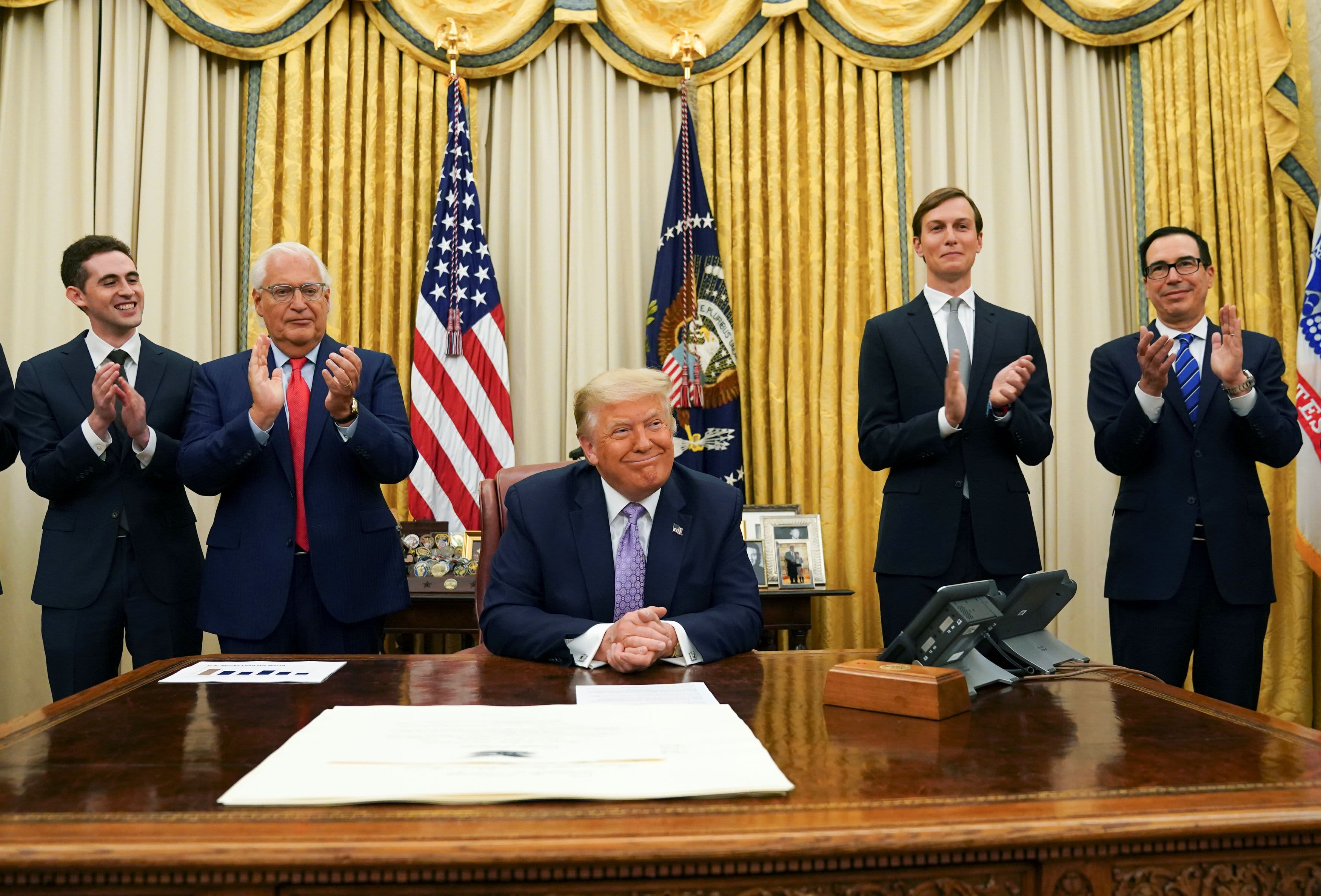DUBAI, United Arab Emirates — President Donald Trump on Thursday announced that the United Arab Emirates and Israel agreed to establish normal diplomatic relations in a development that will put on pause Israel’s efforts to annex parts of the West Bank claimed by Palestinians.
The president released a joint statement from the two countries and the United States on Twitter announcing the move. Leaders of the three countries spoke earlier in the day, according to the statement.
The news comes amid years of warming ties between the UAE and Israel, which until now have not have official diplomatic or trade relations.
The UAE, as with many Arab countries, has had an economic boycott against Israel since its founding and does not formally recognize it. But cooperation between the two on issues like security and the increasing frequency of unofficial meetings by leaders, often aided by Washington, have been widely reported for some time.
The deal makes the UAE the first Gulf state to normalize ties with Israel and only the third Arab country, after Egypt and Jordan, to have open diplomatic ties to the country.
U.S. President Donald Trump receives applause after announcing that Israel and the United Arab Emirates have reached a peace deal that will lead to full normalization of diplomatic relations between the two Middle Eastern nations in an agreement that Trump helped broker, at White House in Washington, U.S., August 13, 2020.
Kevin Lemarque | Reuters
“HUGE breakthrough today! Historic Peace Agreement between our two GREAT friends, Israel and the United Arab Emirates!” Trump wrote in a post on Twitter.
The agreement is a foreign policy win for the president, who is behind in the polls against presumptive Democratic presidential nominee Joe Biden ahead of November’s election.
Trump has made peace in the Middle East a signature element of his first term, though his administration had made little substantial progress.
UAE ruler Mohammed bin Zayed, in more muted language, described the breakthrough primarily as an agreement to stop any further annexation of Palestinian territories by Israel and to establish a “roadmap” toward a bilateral relationship.”
U.S. Secretary of State Mike Pompeo takes part in a meeting with Abu Dhabi Crown Prince Mohammed bin Zayed al-Nahyan in Abu Dhabi, United Arab Emirates September 19, 2019.
Mandel Ngan | Reuters
“During a call with President Trump and Prime Minister Netanyahu, an agreement was reached to stop further Israeli annexation of Palestinian territories. The UAE and Israel also agreed to cooperation and setting a roadmap towards establishing a bilateral relationship,” bin Zayed tweeted.
According to the joint statement, Israel and the UAE also agreed to “expand and accelerate” cooperation on the development of a vaccine for Covid-19.
“Working together, these efforts will help save Muslim, Jewish, and Christian lives throughout the region,” the statement said.
In June, Israeli Prime Minister Benjamin Netanyahu touted the cooperation on the vaccine as a sign of better ties between Israel and the UAE, though UAE officials downplayed the development.
The vaccine cooperation agreement between Israel’s Aerospace Industries and Rafael with Abu Dhabi-based Group 42, was the latest indication of the increasingly rapid rapprochement between the two countries. The two also share a common adversary in Iran, and mutual regional security and commercial interests.
The move could pave the way for similar agreements with Gulf neighbors Saudi Arabia and Bahrain, according to Jessica Leyland, senior analyst for the Middle East and North Africa at political risk firm AKE International.
But it could also backfire on some of the leaders involved, and introduce renewed volatility in the Palestinian territories and states hosting large numbers of Palestinian refugees.
President Donald Trump and Israel’s Prime Minister Benjamin Netanyahu discuss a Middle East peace plan proposal during a joint news conference in the East Room of the White House in Washington, January 28, 2020.
Brendan McDermid | Reuters
“Israeli Prime Minister Benjamin Netanyahu could lose political clout with his right-wing backers given the trade-off between the historic peace agreement and the suspension of West Bank annexation plans for now,” Leyland said.
“The agreement could trigger protests, particularly in Jordan, the West Bank and Gaza,” she added. “Threats could also be made against the UAE by Iran which have been navigating a fragile relationship since volatility in the Gulf hit highs in 2019.
“Nonetheless, establishing a relationship with its third Arab country is a huge step forward in normalizing regional security for Israel.”
Natasha Turak reported from Dubai and Tucker Higgins reported from New York.
